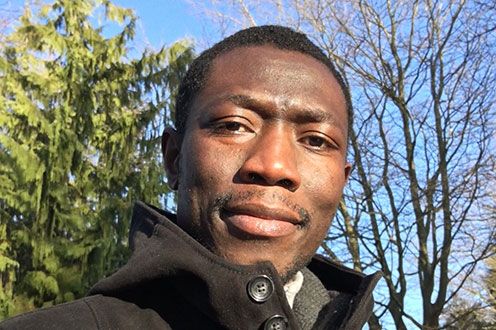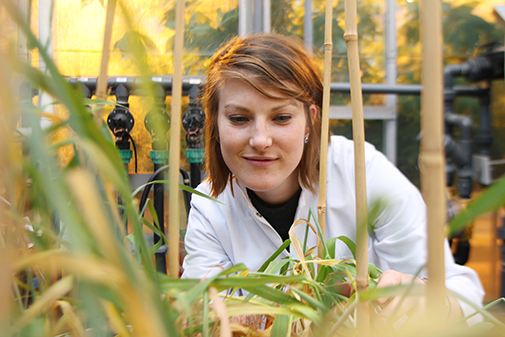Testimonials
Read interviews with two students from the MSc programme in Environment and Development:
An Education for Development
Canadian Sarah d'Apollonia studies Environment and Development at University of Copenhagen. "One of my favorite things about this course is that it is very international. There are people from all kinds of different backgrounds" she says.
Why did you choose the programme?
I chose this programme because I’m interested in both agricultural and developmental work, and I think this programme is a nice mixture of both the theoretical and practical work in this field.
Why did you choose to go to Copenhagen?
The University of Copenhagen offers a lot in terms of academics, and also, Copenhagen is a city with a lot of different aspects that are attractive. It was recommended to me because of the facilities, research, the teaching style and the whole ambience here.
Do you find it different studying in Denmark?
One aspect that is very different from studying in Canada is the group work. In Canada it’s more individually driven, here you are forced to work in groups. Because the programme is so international, there are people from many different cultural, academic or work-related backgrounds and working together in groups is a very realistic model of how we are going to work in the field. So, working in groups prepares me for the real world.
Also with the professors it’s very one-on-one relationships – you get a lot more out of it. Here we know our professors by their first name, and you know what their research is and what they are interested in. I think it really helps because you are able to find a professor who has interests similar to yours. They are very receptive to your ideas and to working with you. They are also very open to sharing their research projects with you which can help you in forming an idea of where you want to head with your programme or with your thesis.
Could you describe a typical day?
A typical day here at the university would be that we start off with a lecture and then later we break off in groups working with assignments related to the lecture and then we come back all together and discuss with the professors and the rest of the class. The university has great facilities in terms of laboratories and the greenhouse is always accessible to students even though you are not in that specific programme.
One of my favorite things about this programme is that it is very international. So there are people from all kinds of different backgrounds. We work together and that’s building relationships within the school and outside the school as well.
And now you are going to visit a developing country as part of the programme?
Yes, a unique feature with this programme is that the university sponsors us to go to a developing country for three weeks to do field work: collecting data, soil samples, measuring carbon stocks. And when we come back to Copenhagen, we have to make and present a report. So it’s very practical. Finally, we present our paper to the tribal leaders.
Next week I will be travelling to the Malaysian part of Borneo, where we are doing a study on the effects of the many oil palm plantations on the local communities and how that impacts them in their livelihoods.
Working in the developing world is very interesting for me. It feels as if it has an impact whether it’s for just a project in a small community or on a larger scale. For me that is really important, something I really want to contribute to. I feel as though with the knowledge from this project, I can really make an impact.
What kind of work does Environment and Development prepare you for?
It prepares you for the real world – in developing countries and with people, where you can make a difference on the local level but also in a global context. There are lots of opportunities to work with NGOs and there are also opportunities to do research and developmental work or maybe get a job with UN.
How do you find Copenhagen?
I really love studying in Copenhagen because it’s such an interesting city, it’s very dynamic and it’s very sustainable, it has this drive to be a greener city and also there are lots of cultural events. Almost every weekend there is a festival in music, art or films. There is always something happening. You can’t be bored in this city.
Copenhagen is a very active city. Everybody is always on a bicycle here, and I participate in a lot of different activities whether it’s rock climbing or cross fit. In the summer it’s really great just to lay outside in the grass and enjoy the music festivals.
If you should sum it all up?
Studying in Copenhagen really gives me a broad perspective of the field of environment and development.
This is definitely an international programme. The lectures are taught in English, and there is also a nice mixture of Danish students with international students coming from as far as Nepal to Mexico – it’s really a great community of internationals.
Another great aspect of this programme is that when I graduate, I already have real experience from working in the field. This is really great for future employment, because employers demand that you have experience, and this programme gives you that experience to put on your resume. I think that will help me get a job, when I graduate.
And finally some advice: when you come to Copenhagen, learn how to ride a bike!
We have talked to Munyaradzi Magundani from Zimbabwe who studies for his MSc in Environment and Development.
A flat hierarchy, good interaction between students and lecturers and a friendly and conducive learning environment are among the things highlighted by Munyaradzi.

Why did you choose to study Environment and Development in Copenhagen?
Because of the quality of education they offer and the reputation of the country on global platforms as a country with clean cities. I chose to come to Copenhagen because I wanted to experience a different culture and learn one of the world’s most difficult languages.
What do you think of the programme so far?
The good thing about the programme is that the interaction between students and the lecturers is very high. The flat hierarchy in the class makes learning more enjoyable because you can air your views without reservation.
The programme offers some practical experience, for instance through the Sustainable Land Use and Natural Resource Management course (SLUSE). It is a programme with an interdisciplinary approach where you team up with a group of fellow students with diverse backgrounds and carry out a research study in a developing country for 2 weeks. SLUSE offers contact experience in development work with farmers.
What do you think of the university and the facilities?
The faculty staff are willing to go an extra mile to help students in their studies. The meetings that are held in the faculty offer great insights on how to tackle the challenges that students might be encountering.
The faculty occasionally holds Environment and Development Cafe’s whereby PhD and former master students pitch about their endeavours and field work and their experiences are quite motivating. The facilities offered by the university make the learning environment friendly and conducive.
What do you think of Copenhagen?
Copenhagen is a beautiful city with a lot of touristic attractions and places. The city has a top-class transport network system that makes it easy to travel around.
Besides being a clean city, it is safe to move around. There are a lot of sporting activities and exhibitions that the city offers, and you have great opportunities to meet and network with people of different backgrounds. Copenhagen is an expensive city to live in as a student; the prices of goods and services are pretty high.
How is your life as an international student in Copenhagen?
I live a great life as an international student. I participate in sporting activities and different workshops and seminars. I try to network with different people. At times life can be very lonely since I am far away from my family and friends in Zimbabwe. I am learning the Danish language as a way to make integration in the community a bit easier.
What are your plans for your future career?
My plan is to stay in Denmark and hopefully find a job in an NGO involved in Development work. If I don’t find a job, I hope to pursue my studies further by doing a PhD here in Denmark if the opportunity arises.
Would you recommend this programme to others?
I would definitely recommend the programme to others but if they hope to stay in Denmark, they need to be aware that the opportunities of landing a job here are not as good as they have been because of the cut down in Development work.

